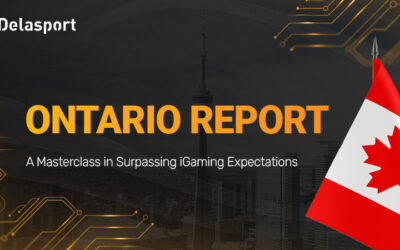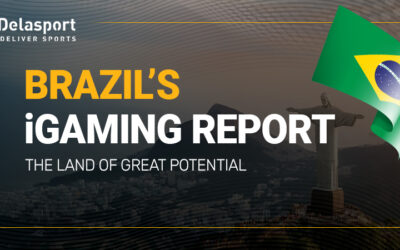
South Africa is an exciting and fast-growing iGaming market. Yet, untangling its regulatory landscape proves to be a challenge without the right partner. Many industry experts consider South Africa to be the prime prospect for gambling in Africa due to its advanced technological infrastructure compared to neighboring countries. All indicators suggest that if South Africa were to implement a comprehensive regulatory framework, it would leverage its existing market strengths and potentially emerge as a leading player in the global iGaming industry.
Currently, online betting licenses are available and are issued by the PLAs (Provincial Licensing Authorities).
Continue reading to explore the deep dive we’ve prepared in order to save you a lot of time and effort when assessing if this exciting market is a good fit for your expansion plans.
Contents
Current Gambling Market in South Africa
Key iGaming Trends in South Africa
The Legislative Timeline in South Africa
Advertising Rules for Gambling in South Africa
Looking Ahead
Current Gambling Market in South Africa
The current state of iGaming verticals in the South African market is as follows: Sports Betting is regulated; Live dealer games are permitted as “contingent events” within the Western Cape and Mpumalanga. Industry suppliers have creatively adapted traditional casino games to comply with existing legal frameworks. This means that, where permitted, they may structure games in a way that aligns more closely with the permitted online sports betting activities. 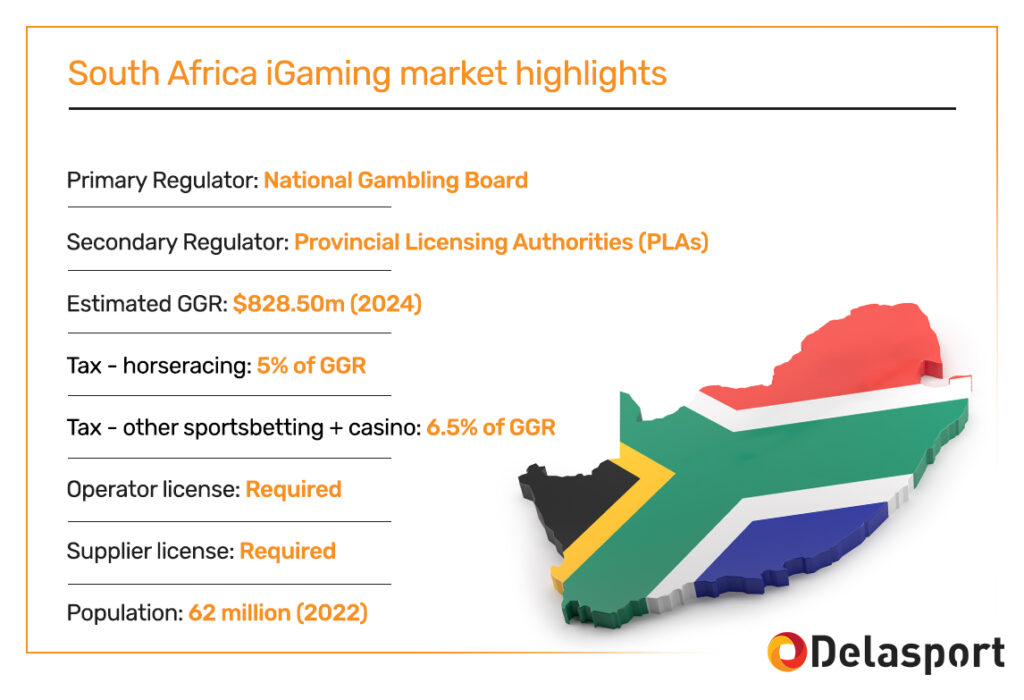
This, along with the fact sports betting is legal and regulated, makes South Africa a prominent iGaming market.
According to Statista, the GGR for 2024 is expected to reach $828.50m and this trend will continue, reaching over $1b in 2028.
Sports betting constitutes 24% of the industry’s earnings and is anticipated to undergo a twofold expansion over the next five years. Roughly half of South Africa’s adult population is estimated to engage in sports betting on a recurring basis.
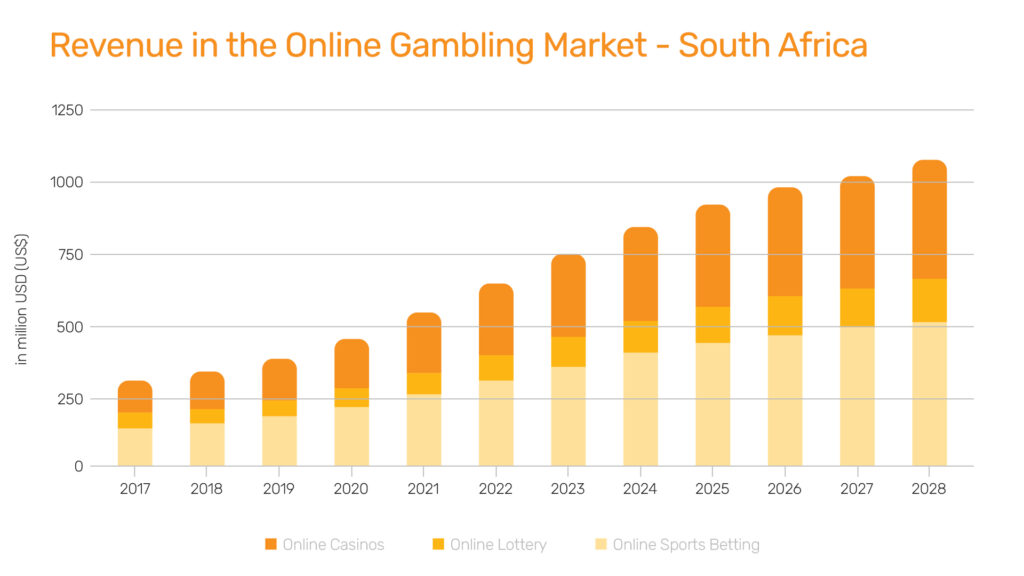 As previously mentioned, South Africa is divided into several regulatory levels and sections. Aside from the National Gambling Board, the country has 9 provinces and each of them is a separate legislative body. The three largest ones in terms of GGR are Gauteng Gambling Board, Western Cape Gambling and Racing Board, and Mpumalanga Economic Regulator (MER). Operators licensed by the PLAs are allowed to attract players from the entire country.
As previously mentioned, South Africa is divided into several regulatory levels and sections. Aside from the National Gambling Board, the country has 9 provinces and each of them is a separate legislative body. The three largest ones in terms of GGR are Gauteng Gambling Board, Western Cape Gambling and Racing Board, and Mpumalanga Economic Regulator (MER). Operators licensed by the PLAs are allowed to attract players from the entire country.
Key iGaming Trends in South Africa
As high-quality mobile devices and fast mobile internet connections (4G/5G) are becoming more and more accessible, it is perfectly understandable that the younger generation is entering the online gambling field as one of the main demographics.
The segment marking an incredible surge is sports betting in general, followed by instant gratification games like Crash games (Aviator, JetX, Skyward, etc.).
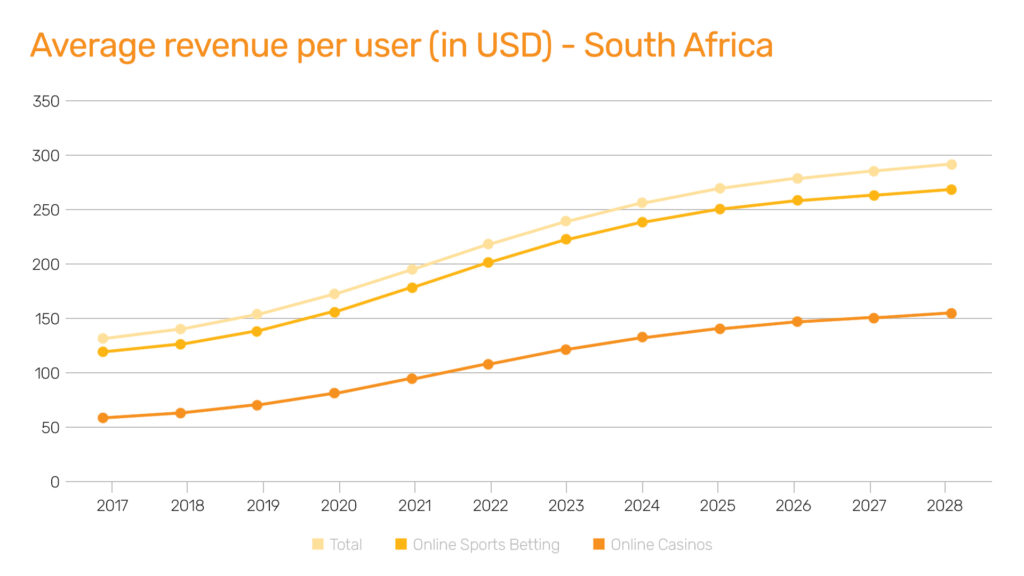
In terms of sports, the top ones on the SA market are soccer and rugby, strengthened by the availability of online platforms that offer a wide range of sports betting options. In terms of online casino, South African players enjoy a wide variety of games, including slots, blackjack, and roulette. And again – a key factor is the fact they can indulge in their hobby from the comfort of their homes.
The national lottery stands out as the most favored game, with roughly 80% of the populace purchasing at least one ticket per week. Sports betting enjoys considerable popularity as well, especially in horse racing, rugby, and football, which attract the highest number of bets with local athletes such as Benni McCarthy, Aaron Mokoena, Steven Pienaar, Siya Kolisi, Bryan Habana, and Cameron Norrie.
A Look at Online Casino
Provincial-licensed online sportsbooks can provide betting on live-dealer casino games, alongside traditional sports events. This is facilitated by certain provincial authorities’ understanding of the definition of bookmaking outlined in the National Gambling Act. Bookmaking, as defined, encompasses the acceptance of fixed odds or open bets on various outcomes: “an event or occurrence of which the outcome is uncertain or unknown to any person until it happens” (Section 1(1), National Gambling Act).
The Legislative Timeline in South Africa
Gambling regulation has a long history in South Africa, beginning in 1996. While it has undergone a lot of discussions and amendments, many of the normative acts are to this day ambiguous and up for interpretation.
The National Gambling Act (1996)
This act paved the way for gambling in SA, way before iGaming enters the picture. It is the act that appoints the National Gambling Board and a licensing framework specifically for land-based betting, including casinos and sports wagering.
The National Gambling Act – Revised (2004)
The reworked version of the National Gambling Act repeals the initial edition and outlines some new definitions. This Act is way more complex and comprehensive than its predecessor and is the source of ambiguity for online gambling in the South African market ever since.
National Gambling Amendment Act (2008)
The National Gambling Amendment Act from July 2008 was meant to legalize the so-called “interactive gambling” in the country which would include online gambling as well, and to make provisions for the regulation of this market. The Amendment Act was actively confronted by the interested parties. This is why the Act hasn’t come into power yet.
The National Gambling Amendment Bill (2018)
A controversial document has been entered into discussions in 2018 and is still up for debate to this day. This is The National Gambling Amendment Bill which aimed to legalize and put a clear frame regarding online gambling, responsible gaming, and many other important topics. It was met with serious opposition from members of the parliament who believed online gambling would do more harm than good in South Africa, which is why it is still tabled after numerous goings back and forth.
Remote Gambling Bill (2022)
After two years of drafting and consultations, the Remote Gambling Bill (B11-2024) was finally introduced to South Africa’s parliament by the main opposition party in April 2024.
While the Bill mandates the application, licensing, and administrative fees, along with possible fines for non-compliance or breaches of the Act, the exact financial amounts, including any potential revenue share models between operators and the government or specific fees for licenses and fines, are not defined within the provided text. Such details are likely to be determined and prescribed through subsequent regulations by the responsible Member of the Executive Council or the Minister after the Bill is enacted and comes into operation.
Licensed casinos and casino operators must adhere to strict regulations regarding responsible gambling, including age verification and self-exclusion measures. Once licensed, operators are subject to ongoing monitoring and audits to ensure they continue to meet these and the many other requirements listed in the Bill.
Advertising Rules for Gambling in South Africa
One of the factors making South Africa so attractive as an iGaming market is the fact that currently there are no explicit regulations outlined regarding the advertisement of gambling or gaming. In South Africa, gambling falls under both national and provincial jurisdiction as per the National Gambling Act 2004 (NGA) and various provincial statutes. Of course, general instructions apply, such as the ones listed in section 15 of the NGA. It prohibits the promotion or advertisement of any gambling activity that:
- Contains false or misleading information
- Violates the NGA or provincial laws
- Targets minors
Additionally, the NGA mandates that gambling-related advertisements include a warning about the risks of addictive behavior and prohibits any promotion encouraging excluded individuals from gambling. According to National Gambling Regulations, advertisements for gambling must:
- Include a warning about the risks of addiction
- Display the name, toll-free number, and slogan of the National Responsible Gambling Programme
- State that only individuals aged 18 or older can participate in gambling
Furthermore, gambling advertisements must not:
- Contain lewd or indecent content
- Encourage excessive gambling
- Suggest illegal activities
- Portray gambling as a solution to financial or personal issues
- Encourage gambling to recoup previous losses
- Promise guaranteed success from gambling
- Imply that gambling is a substitute for employment or a source of financial stability
- Be placed in venues primarily frequented by minors or near educational institutions
Looking Ahead
As we already outlined, the South African market is an intricate, complex, and exciting one. Without the right assistance and a partner, navigating its regulatory maze may be more than challenging. But it’s very much worth it, as evident from all the marked continuous growth of the market.
This is why getting in touch with an expert team like Delasport’s when planning to expand to South Africa as an operator is your best bet. We are familiar with all requirements and limitations, as well as the endless possibilities sports betting in this jurisdiction provides. Dealasport’s sportsbetting platform is fully certified by Gaming Laboratories International (GLI).
Make sure you learn more about our services and get in touch right away.

